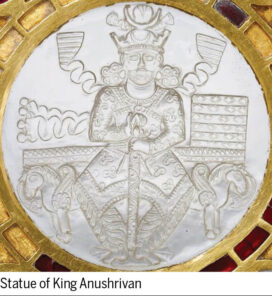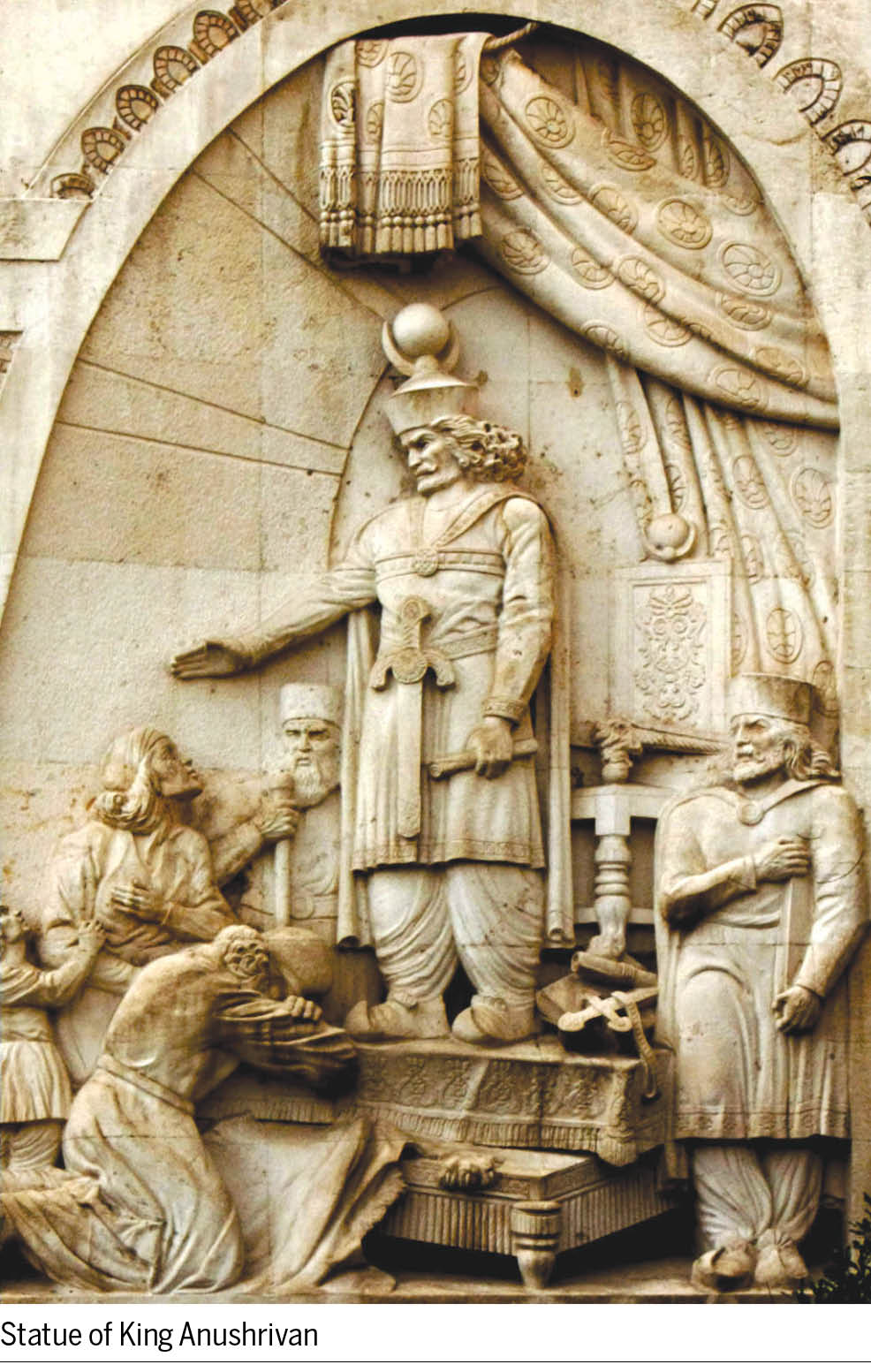 There were many great and glorious kings of ancient Zoroastrian Iran and among those who ruled during the Sasanian dynasty, the name of Khosrow I (also known as Anushirvan or Naushirvan) stands tall. The future Prophet of Islam, Muhamed was born in Arabia in 570 AD., during the long reign of Khosrow (531 AD – 579 AD). The Arabs called him Kisra (Kaiser or Caesar) or Husri.
There were many great and glorious kings of ancient Zoroastrian Iran and among those who ruled during the Sasanian dynasty, the name of Khosrow I (also known as Anushirvan or Naushirvan) stands tall. The future Prophet of Islam, Muhamed was born in Arabia in 570 AD., during the long reign of Khosrow (531 AD – 579 AD). The Arabs called him Kisra (Kaiser or Caesar) or Husri.
The name Khosrow is derived from Pahlavi Husraw, which means ‘of good fame.’ However, he was more well-known by his title Anushirvan which means ‘immortal soul.’ His other title was Dadgar which means ‘dispenser of justice.’ Thus, in history books he is better known as Noshirvan-e-Adel (Noshirvan – the fair, righteous and just.) King Noshirvan ruled for almost half a century and died at the age of eighty-nine. His sense of fairness and justice endeared him to his subjects, and even today people remember him as a leader who was a visionary, innovative, benevolent and just.
Living By One’s Own Established Rules
Once, king Noshirvan ordered his minister Babak to inspect the army. The very next day, Babak summoned the army to gather for inspection. However, after the army had gathered, Babak sent all of them back without formal inspection. He repeated this on the second and third day as well, announcing that the assembly was incomplete. King Noshirvan who was watching the proceedings from his palace, realized the reason behind Babak’s strange behaviour. He instinctively realised that Babak expected the king also to come for the inspection. This was because the king being the supreme commander of the army was also an integral part of the army.
On the fourth day, King Noshirvan presented himself before the minister in full battle regalia along with the army. Like other soldiers, the king submitted himself to tests of agility and reflexes. Then, on Babak’s command he also collected his wages along with the other soldiers. After the inspection was over, Babak came to the king and apologized for treating him like a soldier and not a king. However, king Noshirvan applauded Babak and rewarded him for adhering to the highest norms of his Royal Duties.
Indeed, a good leader must live by and adhere to the rules and principles that he sets. This includes following the same rules and regulations that are expected of others, modelling ethical behaviour, and upholding values.
Leading With Benevolence
A benevolent leader prioritizes the well-being of others and strives to create a positive and supportive environment where everyone can thrive. The early Sasanian kings used to tax 25% of the farmers produce. Noshirvan’s father, Kobad, had reduced the tax to 10%. However, Noshirvan abolished the very tax, starting a new system of taxation which became quite popular.
Noshirvan introduced a nominal land tax based on cultivated area, and taxed orchards by tree count. Payments could be made in three easy instalments across the year. In times of crop failure due to natural calamities, taxes were waived. He created a separate taxation ministry and ensured that land-owning farmers lacking funds received loans from the Agriculture Ministry for seeds, equipment, and cattle. Declaring himself always accessible, he warned officials against harassing citizens. Under his just and compassionate rule, people felt safe and the nation thrived. Noshirvan’s visionary, benevolent leadership brought lasting reforms that truly benefited the State and its people.
The Philosopher Leader
Leadership is not merely a position. It is a mindset, a set of values, and a guiding principle that influences how individuals navigate challenges, inspire others, and drive change. Great leaders use their leadership philosophy as a guiding tool. King Noshirvan was known to the Greeks as the epitome of Plato’s ‘Philosopher King’ since he was intensely interested in philosophy.
King Noshirvan fostered a golden age of learning by inviting scholars and philosophers from India, Greece, and Rome to his court. When Byzantine emperor Justinian I shut down pagan temples and universities, Noshirvan welcomed the displaced faculty and priests to Ctesiphon, his capital. He sparked a renaissance in knowledge and practical sciences that later influenced Arab and European thought.
During his reign, the renowned medical school of Gondeshapur was likely established. Noshirvan sent his court physician, Burzoe (Borzuya), to India to collect Sanskrit texts for translation into Pahlavi. Burzoe is credited with bringing the game of chess to Iran. He was also tasked with finding a mythical life-restoring plant, which he discovered symbolically in the Panchatantra, a treasury of wisdom fables. Though forbidden to copy it, Burzoe memorized and secretly translated it into Persian. Noshirvan praised the work, saying it gave his soul new life; it became known as Kalila, meaning “best friend.”
Noshirvan also advanced the documentation of the Avesta and supported the writing of historical texts like Bastan-nameh and Khuda-nameh, precursors to the Shahnameh. Under his enlightened leadership, the Sassanian Empire flourished culturally and intellectually, reaching the height of its glory.
Innovative Leadership
Innovative leaders drive progress by encouraging creativity, experimentation, and new ideas, which improve systems and inspire collective achievement. King Noshirvan exemplified this during his reign. The Sasanian Ministry of War, led by the Sparapet, was restructured under him and his father, Kobad, with military command divided among four regional leaders. The army combined Achaemenid and Parthian traditions, featuring heavy cavalry, elephants, and archers.
When a commander requested funds to recruit more soldiers, Noshirvan, unwilling to burden his people with taxes, devised a smart alternative. He invited ministers, noblemen, and citizens to send their sons for free military training. This would prepare them to defend the empire in times of war and prevent helplessness during invasions. The plan was well-received, and Noshirvan successfully built a large, skilled fighting force without additional expense or taxation.
Dealing Firmly With Apostates
When Noshirvan was a young prince, a Syrian man named Mazdak arrived at King Kobad’s court, claiming to be a prophet. He preached extreme socialist views, asserting that property and women should be shared by all, as personal ownership led to jealousy, anger, revenge, greed, and lust. Captivated by these ideas, Kobad appointed Mazdak as his minister and treasurer. Mazdak quickly gained thousands of followers, especially from the lower classes.
However, Noshirvan strongly opposed Mazdak’s ideology, particularly after Mazdak made a claim on Kobad’s queen, Noshirvan’s mother. Outraged, Noshirvan refused to follow Mazdak’s teachings. When summoned by his father, he promised to expose Mazdak’s falsehood within six months. Noshirvan conducted thorough inquiries and challenged Mazdak to a public debate. In this intellectual confrontation, Mazdak was defeated, his deceptive philosophy exposed. He and his disciples were sentenced to death. This episode revealed Noshirvan’s commitment to justice and rational inquiry. Despite his father’s bias, he demonstrated the importance of open intellectual debate and upheld truth over blind ideology.
Wise Adviser
A leader’s effectiveness is often directly linked to the quality of his advisors, especially ones who can offer wise counsel and contribute to the leader’s success. Noshirvan was fortunate during most of his reign in having a capable Prime Minister called Bozorgmehr, who became famous in story and legend for his wisdom and abilities. A well-known tale recounts how Bozorgmehr deciphered the rules of chess, which had been sent to King Noshirvan as a challenge by the Indian king. Bozorgmehr played a vital role in Anushirvan’s reign, offering wise counsel on key matters. In Persian literature and art, he is celebrated as a symbol of wisdom and is often depicted alongside Noshirvan, with whom he shared a deep bond of mutual respect and trust.
Another story highlights Bozorgmehr’s insight. A boy planned to test him by hiding a bird in his hands and asking whether it was dead or alive. If Bozorgmehr said alive, the boy would crush it, if he said dead, the boy would release it. Either way, he intended to prove the sage wrong. But Bozorgmehr gently replied, “Young man, whether the bird is dead or alive is in your hands. The choice is yours.”
His profound response reminds us that what we cherish – be it life, relationships or dreams – depends on our choices. What we nurture can thrive, what we neglect may perish. Ultimately, the outcome lies in our hands.
